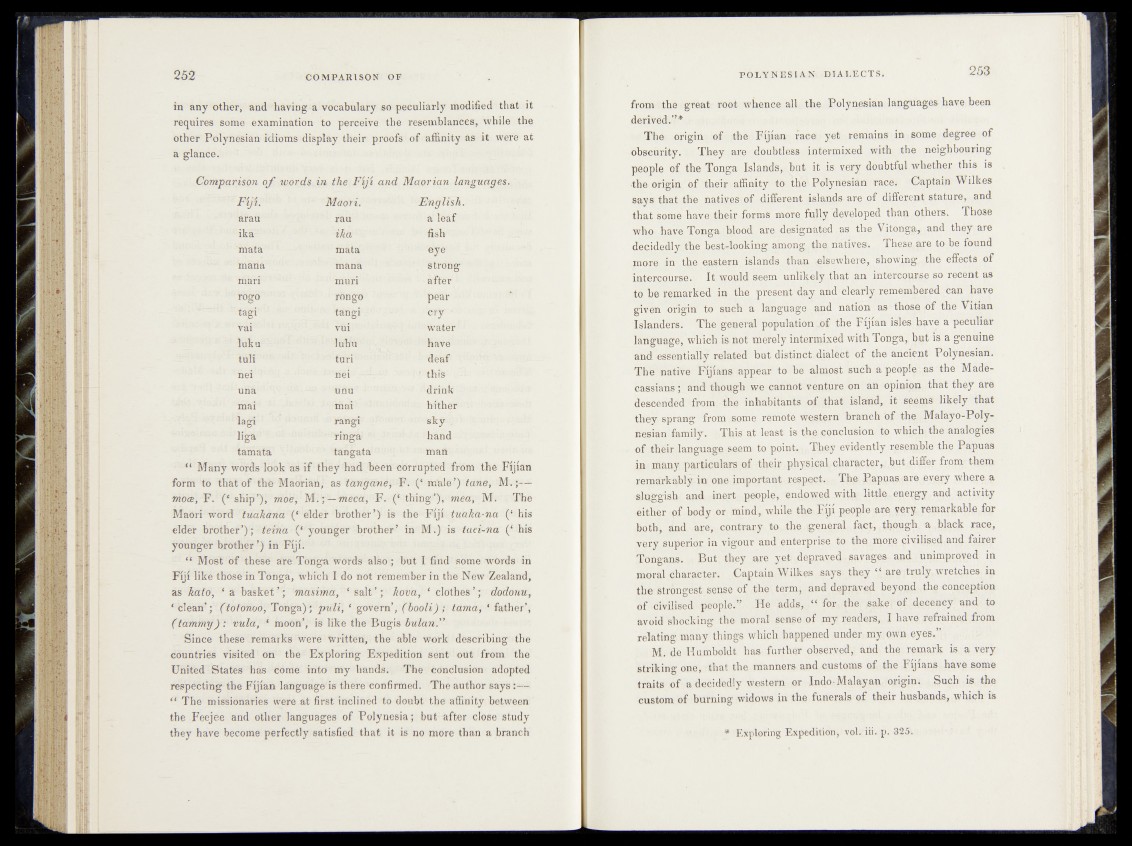
in any other, and having a vocabulary so peculiarly modified that it
requires some examination to perceive the resemblances, while the
other Polynesian idioms display their proofs'! of ^affinity as it were* at
a glance.
Comparison o f words in the Fiji and Maorian languages. ^
Fiji. Maori. English.
arau I rau a leaf
ika ■ iha- % fish
mata mata eye
mana mana \ strong
mari muri - after»
rogo / . O " g ri>ngo pear
tagi tangi ■ cry •
vai vtti Water
luku luhn ■'-‘have-,:!
tuli ' t uri Ri l dbaf
nei I ; h e i: - t* thia
uda unu ? 'drink
mai mai 3i hither
kgi rangi : r sky;v'
liga ringa jP hand
tamata tangata matt
“ Many words look as if they had been corrupted from the Fijian
form to that of the Maorian, as iarigdne$F.^m'&\e’)tane, M.
tnocBj F. (* ship’), moe, M .]—meca, F. (‘ thiog*”), men, M. The
Maori word tuakana (* elder brother’) is the Fijiv two^o-na (>ohis
elder brother’); teiha '(‘ younger brother’ in M.-)' i s .(*-his
younger brother ’) in Fiji.
“ Most of these Ure Tonga words also ; but I find some words in
Fiji like those in Tonga, which I do not remember in the New Zealand,
as kata, ‘ a basket’; 'vnusima, x salt’ ; ’ kptih,l<‘ c l o t h e s dodonu,
‘ Clean’; (totonoo, Tonga); puli, ‘ govern’, (booli); tama, 1 father*,
(tammy) : vula, ‘ moon’, is like the Bugis bulan."
Since these remarks Were Written, the able work describing the
countries visited on the Exploring Expedition sent out from the
United States has come into my hands. The Conclusion adopted
respecting the Fijian language is there confi rmed. The author says t—tft
“ The missionaries were at first inclined to doubt the affinity between
the Feejee and other languages of Polynesia; but-after close study
they have become perfectly satisfied that it is no more than a branch
from ..the great; root whence all the Polynesian.languages have been
derived.’1*
; The- origin,‘of-^tbe- Fijian riac€M remains ‘in' i some >jdegree'. of
obscurity. They-^are* doubtless intermixed with the neighbouring
people of the Tonga I s l a n d s i t ;-is,, vd^y, doubtful whether this is
the origin of theii affi^ft^tO the* TpplytfOshitb °'face,v‘ Captain Wilkes
says that the natiy^sv9o|ivdif^e,jepf^islands are of ’different stature, and
that some* hayfij their forms moTp_ful|y’developed than -others. Those
who have Tonga.:h|ood are,designated- they are
dpcidedlyfithe best^looking amongyt|ief natives. These^aje to be found
more in the eastern islands thau^jg^ewheie, '^i.ow^ng,nthe effects of
inferpo.urse. It would seem unlikely^that an intercojme so recent as
to hb-remarked ip the present day and clearly remembered can have
given origih to such a language and nation as'thosejdf the Vitian
Islanders. Thejgpperail population _of the Fijian isles?hpve a peculiar
language, which,is>not merely inter,poixed with Tonga, bpt is a genuine
and essentially related but distinct, dialect of'the ancient Polynesian,
The!native 'Fijians:-.appear to be almost such a people, as the Madi-
cassians ; and though we cannot venture, on an opinion : that they are
descended'Ifrom the inhabitants of that island, it seems likely that
th|S sprang from ysome remote western branch of the. -Malayo-Poly-
nesian family. This at -least is theqonclusion to which; the analogies
of their, language seem to pointy,-Tbgy evidently rpsgiphje the Papuas
in many particulars of their physical.character, ,butsriti^^r fr-pn^them
remarkably^in one important respect. The Pappas are^eypry where a
sluggish, and . inert people, endpwqd witlv litji%< energy,, apd activity
either pf body or mind, while th.%^yi people -are yery;. remarkableTor
.both, and are, contrary to the general Tac), though a (black race,
vpry superior in vigour and enterprise to th%np>|q civilised.amj fairer
Tongans. But they aye yet- deprayed ,j?urages- apd.; unimproved in
moral character. Captain Wilkes .says,J&ey ‘‘ are .truly, wretches in
the strongest sense of the term*, and depraved beyond <th§ conception
of civilised people.^ He adds, “ for< the sake r of ^decency and to
avoid shocking the moral sense of my readers, I have refrained from
relating many things which happened under, my own .eyes.,”;
v M. de Humboldt has further observed,« and thq remark is, a, very
striking one,-that the raanners and .cjustows of , the Fijians have some
traits of a decidedly Western or Indo-Malayan origin; ,.§uch is the
custom of burning widows in the funerals of their husbands, which is
Exploring Expedition, vol. iii. p. 325.